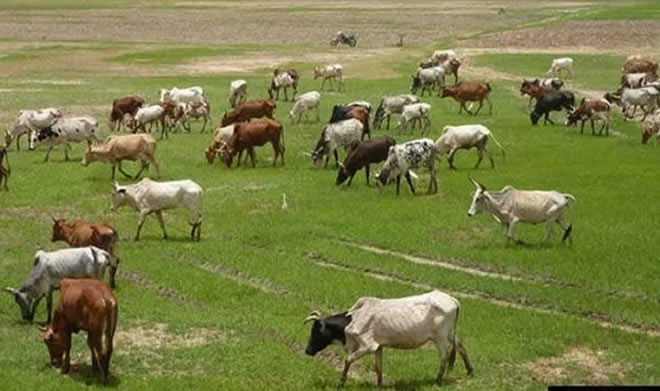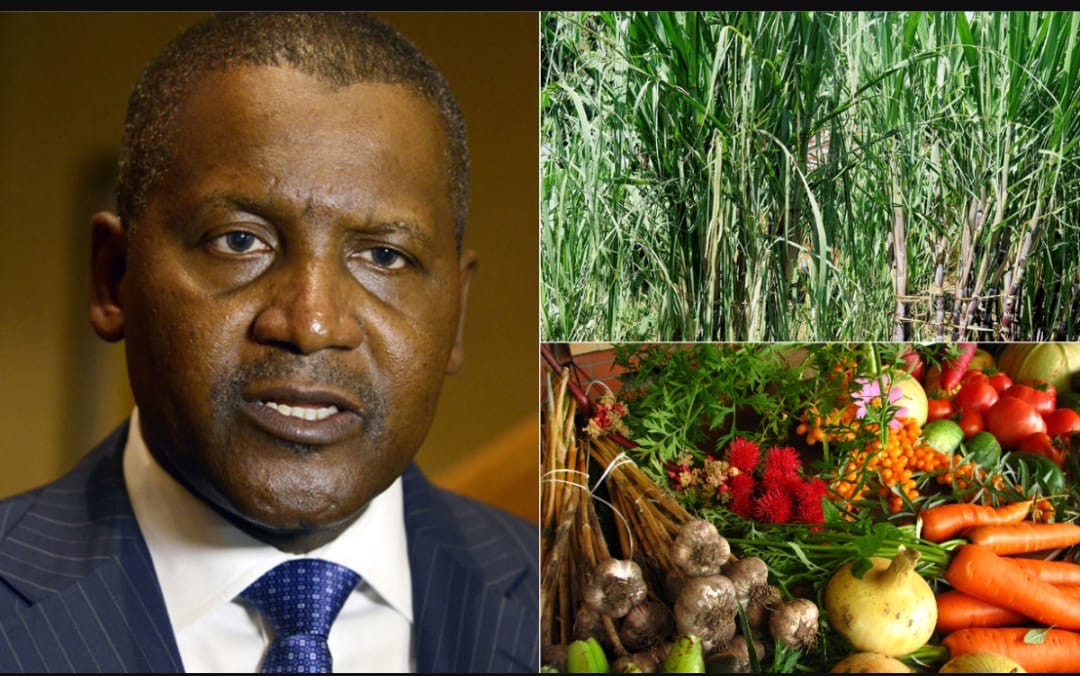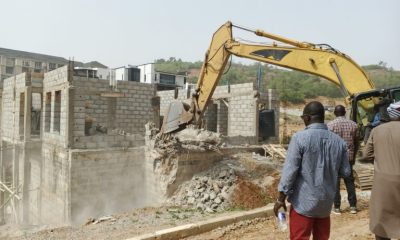Agriculture
Benue Kicks as FG Creates Herdsmen Settlements in 12 States

By Chris Gaga, Markurdi
The Federal Government yesterday said it has begun works on the establishment of “Ruga Settlements” for herdsmen in 12 pilot states nationwide.
Permanent Secretary, Federal Ministry of Agriculture and Rural Development, Alh.
Mohammadu Umar, made this known in an interview in Abuja with newsmen on the sidelines of a workshop on Regional Antimicrobial Resistance (AMR) and associated legislation in West Africa.He said the farm settlements when fully established would address the incessant clashes between Fulani cattle rearers and farmers.
Umar explained that the pilot programme had already commenced on a 31,000-hectare in Kotongora, Niger state.
According to him, the required facilities for a basic life and treatment of cattle are being provided to enhance productivity, even as he noted that the government would replicate the programme in selected states as work “is ongoing in the 12 pilot states”.
He said six settlements will be established in each of the pilot states.
Umar, who added that the centres would be expanded and adequately equipped, and assured the beneficiaries that government would do all that was necessary to enlighten the herdsmen on how the use of ranches could make cattle rearing more profitable.
He said the government would sensitise the herdsmen to the social and political benefits derivable from such settlements.
The permanent secretary explained that various spots would be established for the pastoralists to be able to milk their cows.
He also said dispensaries would be established to prevent the misuse of antibiotics.
The “Ruga Settlement” idea was an initiative of the National Economic Council (NEC) presented under the National Livestock Transformation Plan (2018-2027).
It was an initiative to stop the age-long herders-farmers crisis and to massively develop the livestock industry.
The initiative seeks to promote ranching as the way forward for cattle rearing in the country.
According to the permanent secretary, nomadic livestock production in Nigeria is facing major challenges and is at crossroads due to declining availability of pasture, overgrazing, and expanding fatal conflicts between pastoralists and crop farmers.
He said the impact on food and nutrition security as well as ”public safety and national security are huge and far-reaching, therefore government is bent on making the plan to work as it has commenced.
“Under the new plan, cattle herders are expected to be registered and recognise with cooperatives for the purpose of the ranching scheme.
“These cooperatives will then be able to get rental agreements for land from state governments and also benefit from ranch resources on several terms including loans, grants, and subsidies,’’ he said.
Mr Suffyan Koroma, Food and Agricultural Organisation (FAO) Country Representative, said the workshop was organised to prepare the organisation’s representatives and respective countries and regions to work out ways to tackle the impending dangers of AMR and AMU.
“This is because the misuse of antibiotics in agriculture contributes to the spread of AMR and also undermines the efficacy of veterinary and human medicines. FAO is set to provide support to governments and stakeholders to adopt measures to minimise the use of antimicrobial and reduce AMR,’’ he said.
Meanwhile, the Benue state government has kicked the purported plans by the Federal government to commence establishment of RUGA settlements in selected local governments of Benue state.
In a Press statement by Terver Akase, the Chief Press Secretary to Governor Samuel Ortom, reiterated that Benue does not have the land for grazing reserves, grazing routes, cattle colonies or RUGA settlements, but accepted that the State only has land for the establishment of ranches.
Ruga which is said to mean ‘Fulani Settlement’ in some parts of the states across the country is a directive of the federal government being implemented by the Federal Ministry of Agriculture Abuja. It is said to be implemented in Otukpo, Tarka and Ukum LGs of Benue State.
The Statement reiterated the firm stand of governor Samuel Ortom against grazing reserves and other policies rather than ranching, noting that the state government was ready to support any one who is ready to establish ranching in the state.
It maintained that Benue people were totally against the federal government’s RUGA and would not accept any imposition of any policy bothering on animal’s husbandary in their lands.
“We find the approach of the Federal Ministry of Agriculture not only as a gross violation of the Ranching law but also as an insult to the sensibilities of the entire people of Benue State.
“It could be recalled that the people and government of Benue State rejected cattle colonies and still reject the policy in whichever robes it is disguised,” it reads.
The CPS explained the Governor’s resolve that ranching remains a lasting solution to the incessant herders and farmers crisis which the country ought to embrace.
“We wish to remind those pushing for Ruga settlements that the Constitution of the country gives states the right to make laws for the governance of their people. Any attempt to subvert such right is a direct attack on the Constitution. Those behind such a move are enemies of peace and progress.
“The Government of Benue State is willing to support cattle owners to establish ranches as stipulated by the law prohibiting open grazing.”
Meanwhile, the need to support the full implementation of the Anti Open Grazing and Ranches Establishment Law has been advocated as a stand point to possible return of peace in all communities of Benue State.
Also, the need for government to create jobs for the growing population of youths in the country so as to curtail youth involvement in cultisms and other crimes has been advocated.
These were the fallout of a one day Peace Architecture Dialogue (PAD) meeting on the theme; “Transforming the Farmer-herder Conflict and Promoting the Freedom of Religion and Belief in Nigeria’s Middle Belt” as organized by Search for Common Ground in Makurdi.
The Permanent Secretary, Ministry of Information and Orientation, James Agbo observed that if the Benue peoples open grazing prohibition law is faithfully obeyed as been implemented, peace will be inevitable in the state
Agbo encouraged the police and other security agencies to wake up to their responsibilities of ensuring that laws of the land are respected by all inhabitants, even as he urged ‘Search’ to take the sensitization to the rural areas too.
The Ter Makurdi, Chief Sule Abenga employed NGOs such as ‘Search’ to adopt the Anti Open Grazing and Ranches Establishment Law as a stand point to their peace crusade in Benue.
Chief Abenga expressed believe that the initiatives such as SEARCH would help sensitize the people and concerned agencies towards advancing peace in the society.
He challenged parents to see every youth as their wards by inculcating moral values especially when such wards are engaged in social vices.
The Chief assured of the cooperation of the traditional institution at ensuring that the NGO records success in their goals.
Representative of the Benue State Police Command, DCP Ibrahim Zakari, noted that for peace to be achieved, the causes of crisis must be highlighted and tackled accordingly.
He identified some of the causes to include increase in d country’s population, recklessness on the part of cattle rearers amongst other things.
In a presentation titled, “Distinction between Cultism and Miscreant Activities to Breach of Peace in the State”, representative of the DSS,
Benue Command, Austine Audu identified peer group influence, drug addiction, poor parenting, frustration and the like as major causes that endear youth to cultism and other vices.
Audu while commending the state open prohibition law, called on government to step up action in the creation of jobs so as to disenable the youth from constituting miscreants in the society.
He challenged the media to step up enlightenmenymt programmes on the need for peaceful coexistence, even as he called for reorientation of students in the tertiary institutions against social vices.
Some Stakeholders at the dialogue meeting including the Chairman of Miyethi Allah Cattle Breeders Association of Nigeria(MACBAN), Zakari Mohammed, representative of Benue State Planning Commission(BSPC), Mrs. Nambativ Helen, representative of the Benue State Vigilante Group, Dr Daniel Bo, AFAN and other stakeholders made various contributions bothering on the peace move.
Benue State Coordinator of ‘Search for Common Grounds’, Chorbe Joshua appreciated stakeholders for their various contributions at ensuring the possible return of peace, adding that the resolutions met at the meeting will enhance the next action plan of the organization.
Agriculture
FG Empowers 9,870 Farmers with Inputs, Modern Rice Technologies in Kano

The Federal Government, through the Kano State Special Agro-Processing Zone (SAPZ) Programme in partnership with IFAD, has empowered 9,870 rice farmers in Kano with climate-resilient inputs and modern rice production technologies.
This was contained in a statement issued by the SAPZ Knowledge Management and Communication Officer, Rabi Mustapha.
The State Project Coordinator, Aminu Iliyasu, disclosed this on Sunday during the Farmers Field Day at Chiromawa Garin Babba Cluster in Garun Malam Local Government Area.
He said the exercise was organised to expose the farmers to Science-based and practical solutions capable of enhancing yields, improving food security, and boosting rural livelihoods.
Iliyasu described the field day as a celebration of knowledge, innovation and the resilience of smallholder farmers.
He explained that the SAPZ initiative in Kano aimed to expand access to improved technologies, strengthen extension services, reduce post-harvest losses and create market opportunities for rural farmers.
“These innovations are not theoretical. They are practical solutions that farmers can adopt immediately to raise productivity and increase income,” he said, while commending the support of local authorities.
Mustapha said the inputs distributed to 9,870 farmers included FARO 44 improved seeds, Urea and NPK fertilizers, and insecticides, targeting beneficiaries in Garun Malam, Gezawa, Bichi and Bagwai LGAs during the 2025 wet season.
She added that experts trained farmers on soil selection, seed dressing, nursery establishment, land preparation, and timely transplanting at proper spacing.
“They also covered fertilizer management, weed control, Integrated Pest Management and water regulation to boost rice yields.
“The training emphasised harvesting at optimal maturity, drying paddy to safe moisture levels, and fumigation using phostoxin to prevent storage losses,” she stated.
A beneficiary, Salamatu Ali, said the intervention had positioned Kano farmers to boost yields, withstand climate pressures and increase household incomes.
Another farmer, Huwaila Ibrahim, said the programme transformed her approach to rice production.
“Before, we planted without checking whether the land was suitable.
“Now, we first assess the soil to ensure it matches the seed variety. This season, we cultivated FARO 44,” she said.
Ibrahim added that her output increased from 20–25 bags per acre to about 40 bags after adopting the improved technologies.
Agriculture
FG Unveils National Agricultural Sample Survey, 2023 Report for Food Security

The Federal Government has launched the National Agricultural Sample Survey (NASS) 2023 report, towards developing data-driven policies to achieve food security and economic diversification.
Minister of Agriculture and Food Security, Sen. Abubakar Kyari, made this known at the launch of “Disseminating the National Agricultural Sample Survey (NASS) 2023 report” on Tuesday in Abuja.
“As a Ministry, we will apply these findings across the core levers of agricultural transformation, ensuring that our programmes remain data-driven, impact-focused and aligned with the aspirations of the Renewed Hope Agenda.
“A nation that measures well governs well. And food security begins with information security.
“This report should be seen as a practical tool for decision-making, one that guides policy choices, informs investment priorities and accelerates the reforms required across Nigeria’s agricultural sector.
“In a country of more than 232 million people, the strength of our food system depends on the quality of the data that guides national decisions,” Kyari said.
The minister explained that without credible evidence, interventions risk being misdirected and investments may fail to reach the areas of highest need.
The News Agency of Nigeria reports that Food and Agriculture of the United Nations (FAO) in collaboration with the Federal Ministry of Agriculture and Food Security, National Bureau of Statistics and the World Bank launched “Disseminating the National Agricultural Sample Survey NASS the 2023 report”.
He stated that the National Agricultural Sample Survey provides reliable, sector-wide data that helps the agriculture sector track production, understand emerging trends, and guide policy decisions.
Kyari added that the launch and dissemination of the National Agricultural Sample Survey 2023 represents an important step in ensuring that our national choices are informed, targeted, and grounded firmly in evidence.
“This report therefore represents more than statistical outputs; it reflects our commitment to transparency, disciplined planning, and the sustainable development of Nigeria’s agricultural sector.
“The findings of the National Agricultural Sample Survey 2023 present a clear and compelling picture of national production.
“The data we are presenting today is central to that mandate because it gives us the precision required to target interventions, close gaps, and drive the reforms needed to secure our nation’s food system.
“These data points also remind us that every figure reflects real activity across the country, from production to processing to marketing.
“With these digital foundations in place, insights from the NASS move from static data to operational intelligence, enabling a more transparent, efficient and connected agricultural system,” the Minister said.
The Director-General FAO representative in Nigeria, Dr. Hussein Gadain, said the NASS 2023 Report is not just a presentation of data but a celebration of collaboration, commitment, and progress towards building a stronger, more resilient agricultural sector in Nigeria.
Similarly, Adeyemi Adeniran Statistician General of National Bureau of Statistics (NBS) said that the NASS Report 2023 provides critical information on crop production, livestock, aquaculture, labour amongst all.
Adeniran who was represented by David Babalola an official of NBS said that data is essential for shaping effective policies and driving sustainable growth.
According to him, the survey also reaffirms the national bioscience commitment to upholding global best practices in data production through improved methodologies, enhanced field operations, rigorous quality data assurance processes and development of modern digital tools, in Nigeria.
Henry Karshima, Assistant Chief Forest Officer in the Ministry of Environment said that the role of agriculture cannot be overemphasised in food security especially with the launch of the survey.
Mr Abdulhameed Umar National Project Coordinator for Agro-Climatic Resilience in Semi-Arid Landscapes expressed satisfaction with the project in the line of restoring land degradation through data collection.
On his part, Asad Alam, the Senior Economist and Project leader 50×2030 Initiative World Bank Nigeria Development Data Group, Economic Division commended the initiative of making data a priority in agricultural activities to ensure food security.
Agriculture
Dangote Restoring Value to Agriculture, Sponsors 2025 Agric Show

By David Torough, Abuja
The Dangote Group has said that it is collaborating with strategic partners to revitalise and strengthen the agricultural sector of the Nigerian economy.
This development comes as the company sponsors the 17th National Agricultural Show, which opens on Tuesday, November 25, 2025, in Keffi, Nasarawa State.
The company’s spokesman, Anthony Chiejina, stated that expanding mechanised agricultural practices will play a critical role in boosting Nigeria’s GDP while creating meaningful employment opportunities for the country’s growing youth population.
“Through this partnership, the company aims to encourage greater participation in commercial agriculture and reinforce its role in advancing Nigeria’s economic growth,” he said.
He said the theme for this year’s Show: Employing Smallholder Farmers: Restoring Value, Ensuring Productivity will Ensure Attainment of Food Security in Nigeria, is apt.
Chiejina said: “Restoring the value of agriculture offers Nigeria more than nostalgic appeal; it provides a pragmatic route to economic renewal. With the right incentives and modern practices, agriculture can once again serve as a reliable engine of growth, anchoring jobs, stabilising markets and giving the economy a sturdier foundation.”
The Agricultural Show, a fixture in Nigeria’s agricultural calendar, offers a platform for showcasing innovation across the value chain.
The statement said the company is currently developing rice mills in Kano, Jigawa, Niger, Kebbi, and Sokoto States, with a combined total milling capacity of 1.5 million tonnes per annum.
It noted that the effort is intended to support the government’s broader push for food security.
The statement quoted the Senior Adviser to the President of the Dangote Group, Mrs. Fatima Wali-Abdurrahman, as saying that, in line with the company’s commitment to restoring value to agro-allied industrialisation in Nigeria, it is investing heavily in its backward-integration projects in the sugar sub-sector in Nasarawa and Adamawa States.
She said as part of its contribution to the agricultural sector, the company has a fertilizer complex in Lagos, located in the Lekki Free Trade Zone, with a production capacity of 3 million metric tonnes per annum of urea.
On the participation of the Dangote Group, Chairman, Board of Trustees (BoT), National Agricultural Foundation of Nigeria, organizers of the annual National Agric Show, Arc Kabiru Adamu, said: “Dangote Group has been our greatest ally from inception and we have enjoyed tremendous and invaluable support from them such that without them we will not be able to continue to hold the show efficiently.”
Adamu, who is also the President, All Farmers Association of Nigeria (AFAN) urged the Dangote Group to focus on agriculture, after its success in the oil and gas sector.
He added that: “This year we envisage a tumultuous turn out of farm machinery manufacturers, processors, researchers and youth and women farmers answering the clarion call to bolster Nigeria’s food system.”

























